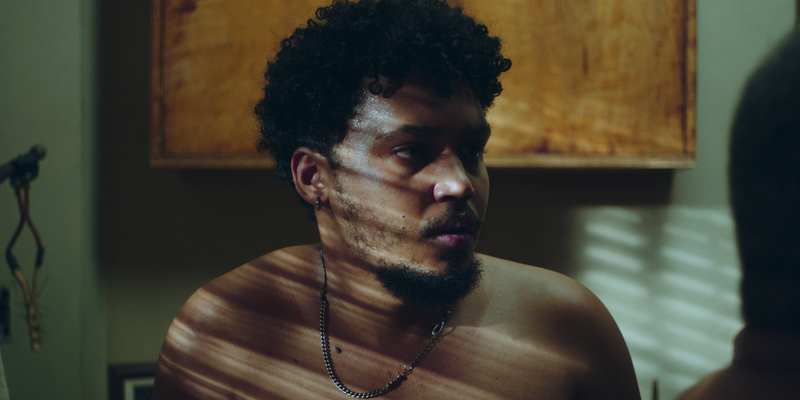
Review by
Eric Hillis
Directed by: Guto Parente
Starring: Lucas Limeira, Carlos Francisco, Rita Cabaço, Tarzia Firmino

Movies shot during and concerning the COVID pandemic continue to
trickle out from various corners of the world. Many of them have blurred
into one indistinguishable mass at this point, too many of them made by
filmmakers who felt compelled to make something, anything, to avoid
going out of their minds. Guto Parente's
A Strange Path is a rare piece of pandemic cinema that
takes advantage of the specific circumstances of that recent period of
history to explore a universal theme, in this case the often strained
relationships between fathers and sons.

It's early March, 2020, when the world is still trying to figure out
how best to deal with what may or may not be an oncoming global
pandemic. Having spent his last 10 years in Portugal with his mother,
young filmmaker David (Lucas Limiera) returns to Brazil, where
his experimental film is to be screened at a festival in his hometown.
His mother has given him the address of his estranged father, Geraldo
(Carlos Francisco), but David has little interest in
reacquainting himself with his old man. That's until he begins to have
visions of his father in dreams and wheeling a large door through the
night-time streets on a trolley. When the film festival is rescheduled,
his flight back to Portugal is cancelled, his hostel is shut down and
his phone is stolen, David decides to see if he can stay with his
father. The old man is initially happy to see his son, but he takes some
convincing to allow him to crash on his couch.

As the days pass, David's interactions with his father become
increasingly strained, and increasingly surreal. Geraldo spends his
every waking hour typing up some sort of manuscript, the contents of
which he refuses to discuss with David. Whenever David asks anything
remotely personal, Geraldo angrily snaps, threatening to kick him out.
The food in the fridge is several years out of date. At times Geraldo
seems to freeze, unblinking in front of his computer, which he refuses
to allow David to use to make any arrangements to leave or check in with
his girlfriend back in Portugal.
There are however brief moments of connection between the two. When
David eventually convinces his father to watch his film, Geraldo seems
genuinely proud of his son's achievements. He can't quite bring himself
to say so directly, but Francisco's half-smile is telling. Such moments
will likely be recognisable to many male viewers. My own father never
told me he was proud of me (not that I ever gave him any particular
reason to be), but after his death I would hear from his friends how
often he spoke of me. We get the sense that Geraldo's outward
frustrations with his son may be his way of distancing himself from some
guilt over not being a part of his life.

When Geraldo develops a bad cough but refuses to seek medical help,
we're reminded of the paranoia we all had regarding the safety of our
elderly family members during the pandemic. The narrative begins to take
a surreal turn at this point, though I can't imagine too many viewers
will be surprised by the eventual revelation of what's really been
playing out. The effectiveness of the "twist" is a moot point however,
as this is essentially a tender drama of reconnection and
reconciliation. Parente dedicates his film to his own late father, and
it's easy to surmise David is a surrogate for himself and this is his
way of saying goodbye to a father he possibly struggled to communicate
with while he was alive. Regardless, he's no doubt made his old man
proud.


